Reading
1. Look at the picture and answer the questions.
Nhìn vào bức tranh và trả lời các câu hỏi.
a. What are the people in the picture doing? (Những người trong tranh đang làm gì?)
b. Do you think they are happy? Why / Why not? (Bạn có nghĩ họ đang hạnh phúc không? Tại sao?)
2. Read the text below and decide which of the following is the best title for it.
Đọc bài văn sau và quyết định tiêu đề nào dưới đây là phù hợp nhất.
a. Doing Housework is Good for Children
b. Husbands Who Share Housework Make Their Wives Happy
c. Sharing Housework Makes the Family Happier
In many cultures, doing housework is considered a woman’s duty. The mother is usually the homemaker, who has to do most of the household chores, while the father is the breadwinner, who is responsible for the family finances. However, it is not good for the mother when the rest of the family does not help out. When families share household chores, it is good for them as individuals and good 5 for all the relationships within the family.
According to psychologists, most people do not realise the enormous benefits that come to a family when husbands and children share the housework. Children who share the housework with their mums and dads do better at school, become more sociable, and have better relationships with their teachers and friends. They learn good skills, are more responsible, and tend to be overall good people. When men share the housework, they tend to have better relationships with their wives. Women often feel happy when they see their husbands doing housework because it says, ‘He cares about me and he doesn’t want to put all of the housework on me.’ Women whose husbands do not contribute to the household chores are more vulnerable to illness and tend to think more about divorce.
When everyone works together on household chores, it creates a positive atmosphere for the family 15 and sets a good example for the children. This is especially true if mum and dad can find a way to work well together and are not critical of each other.
a. Làm Việc Nhà là Tốt cho Trẻ Em.
b. Những Ông Chồng Chia Sẻ Việc Nhà Làm Vợ Họ Hạnh Phúc.
c. Chia Sẻ Việc Nhà Làm Gia Đình Hạnh Phúc Hơn.
Ở nhiều nền văn hóa, làm việc nhà được xem là nghĩa vụ của người phụ nữ. Người mẹ thường là người nội trợ, người phải làm hầu hết những công việc gia đình, trong khi người cha là lao động chính, người đảm nhiệm vấn đề tài chính của gia đình. Tuy nhiên, sẽ không tốt cho người mẹ khi những người còn lại trong gia đình không hề giúp đỡ gì. Khi các gia đình chia sẻ việc nhà, sẽ tốt cho tất cả cũng như từng cá nhân và tốt cho tất cả mối quan hệ tron gia đình.
Theo các nhà tâm thần học, hầu hết mọi người đều không nhận ra lợi ích khổng lồ đến với một gia đình khi những người chồng và con cái chia sẻ công việc nhà. Những đứa trẻ chia sẻ việc nhà với mẹ và bố của mình thường học tốt hơn ở trường, trở nên cởi mở hơn, và có những mối quan hệ tốt hơn giáo viên và bạn bè. Chúng học được những kĩ năng hay, và có trách nhiệm hơn, có xu hướng là những người tốt. Khi đàn ông chia sẻ công việc nhà, họ có xu hướng có mối quan hệ tốt hơn với vợ mình. Phụ nữ thường cảm thấy hạnh phúc khi thấy chồng mình làm việc nhà bởi vì điều đó nói lên rằng "Anh ấy quan tâm đến tôi và anh ấy không muốn đặt tất cả công việc nhà lên tôi.” Phụ nữ có chồng không đóng góp trong việc nhà thường nhạy cảm hơn với bệnh tật và thường nghĩ đến li hôn.
Khi mọi người làm việc cùng nhau trong công việc nhà, điều đó sẽ tạo ra một bầu không khí tích cực cho gia đình và làm gương tốt cho trẻ em. Điều này đặc biệt đúng nếu bố và mẹ có thể tìm ra cách làm việc tốt cùng nhau và không phán xét, chỉ trích người còn lại.
Key : C
3. Read the text again. Do you understand the words from the context? Tick the appropriate meaning for each word from the text.
Đọc lại bài văn. Bạn có hiểu những từ trong văn cảnh? Chọn nghĩa phù hợp với mỗi từ trong bài văn.
1. sociable
a. friendly
b. unfriendly
2. vulnerable
a. able to be well protected
b. able to be easily physically, emotionally, or mentally hurt
3. critical
a. saying that something is good
b. saying that something is bad
4. enormous
a. not very large
b. very very large
5. tend
a. likely to behave in a particular way
b. unlikely to behave in a particular way
Key
1. a
2. b
3. b
4. b
5. a
4.
a. What does it” in line 11 mean ...?
A. women feeling happy
B. women seeing their husbands doing housework
C. the husbands doing housework
b. What does ‘it’ in line 14 mean ...?
A. a good example for children
B. everyone working together in the house
C. a positive family atmosphere
Từ ‘it’ ở dòng 11 nghĩa là gì? Từ ‘it’ ở dòng 14 nghĩa là gì?
Key
a. C
b. B
5. Answer the questions.
Trả lời các câu hỏi.
a. How do children benefit from sharing housework? (Trẻ em hưởng lợi ích như thế nào từ việc chia sẻ việc nhà?)
b. Why do men tend to have better relationships with their wives when they share housework? (Tại sao đàn ông có xu hướng có mối quan hệ tốt hơn với vợ khi họ chia sẻ việc nhà?)
c. What may happen to women whose husbands do not contribute to the household chores? (Cái gì có thể xảy ra với phụ nữ nếu chồng họ không tham gia làm việc nhà?)
d. How does the family benefit when everyone works together on household chores? (Gia đình có lợi gì khi mọi người làm việc nhà cùng nhau?)
6. Discuss with a partner.
Thảo luận với một người bạn.
a. Do you have any problems with sharing housework? (bạn có gặp khó khăn gì khi chia sẻ việc nhà?)
b. What benefits do you get when sharing housework? (lợi ích mà bạn đạt được khi chia sẻ việc nhà là gì?)
Speaking
1. Which household chores do you like doing and which do you dislike? Write your answers to the questions in the table below and add a reason.
Việc nhà nào bạn thích và không thích làm? Viết câu trả lời cho các câu hỏi dưới bảng sau và lí do tại sao.
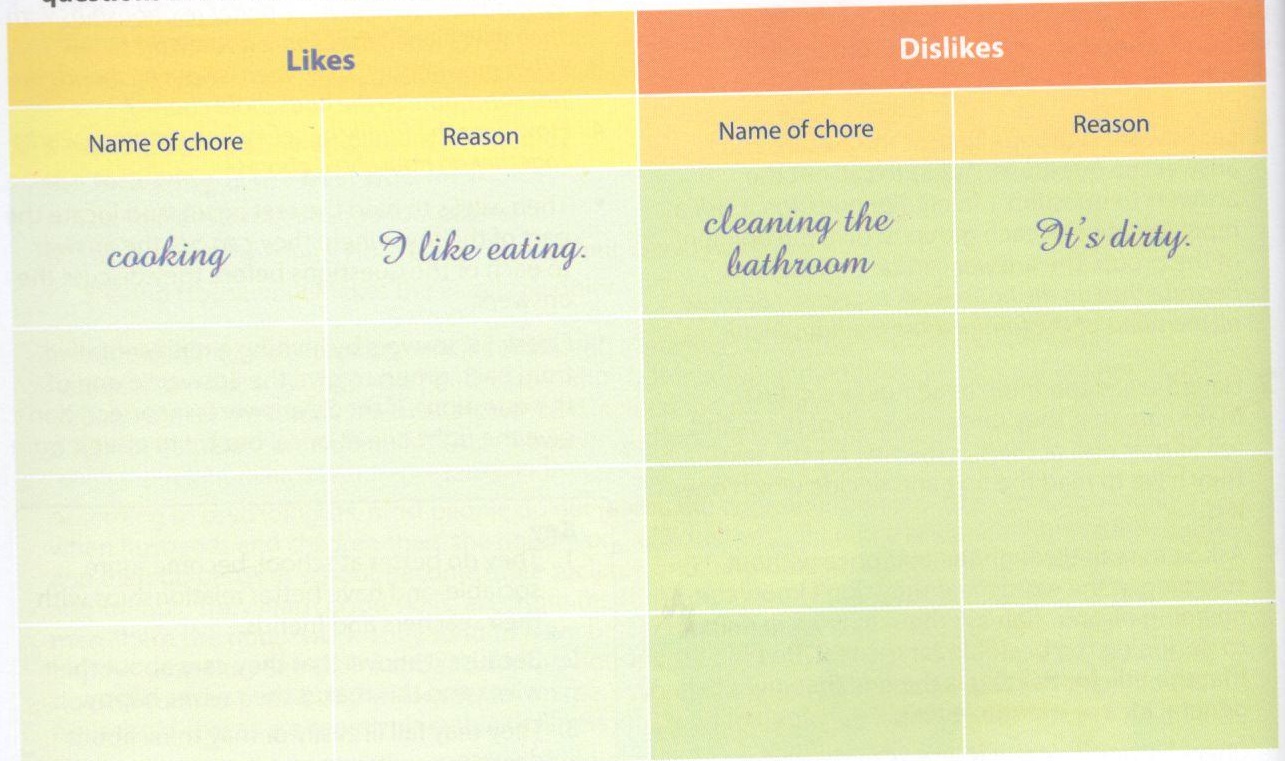
2. Below is part of Anna’s interview with Mai. They are talking about the household chores Mai likes and dislikes. Match Mai’s answers with Anna’s questions. Then practise the conversation.
Dưới đây là buổi phỏng vấn của Anna với Mai. Họ đang nói về những việc nhà Mai thích và không thích. Nối những câu trả lời của Mai và những câu hỏi của Anna. Rồi tập luyện đoạn hội thoại.
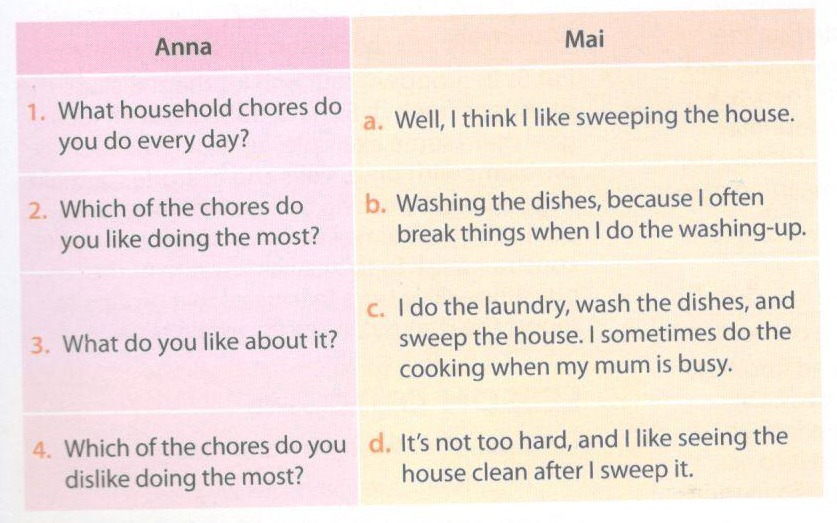
Key
1. C
2. A
3. D
4. B
Audio Script
Anna: What household chores do you do every day?
Mai: I do the laundry, wash the dishes, and sweep the house. I sometimes do the cooking when my mum is busy.
Advertisements (Quảng cáo)
Anna: Which of the chores do you like doing the most?
Mai: Well, I think I like sweeping the house.
Anna: What do you like about it?
Mai: It’s not too hard, and I like seeing the house clean after I sweep it.
Anna: Which of the chores do you dislike doing the most?
Mai: Washing the dishes, because I often break things when I do the washing-up.
3. Have a similar conversation with a partner. Find out which chores she / he likes or dislikes the most and why. Report your findings to the class.
Làm một đoạn đối thoại tương tự với một người bạn. Tìm ra công việc nào bạn ấy thích hoặc không thích nhất và lí do tại sao. Tường thuật lại với cả lớp.
Listening
1. Look at the chart and discuss the changes in weekly hours of basic housework by married men and married women in the USA between 1976 and 2012. Guess the reasons for the changes.
Nhìn biểu đồ và thảo luận những thay đổi trong giờ làm việc hàng tuần của phụ nữ và đàn ông đã có gia đình ở Mỹ từ năm 1976 đến 2012. Đoán lí do tại sao lại có sự thay đổi này.
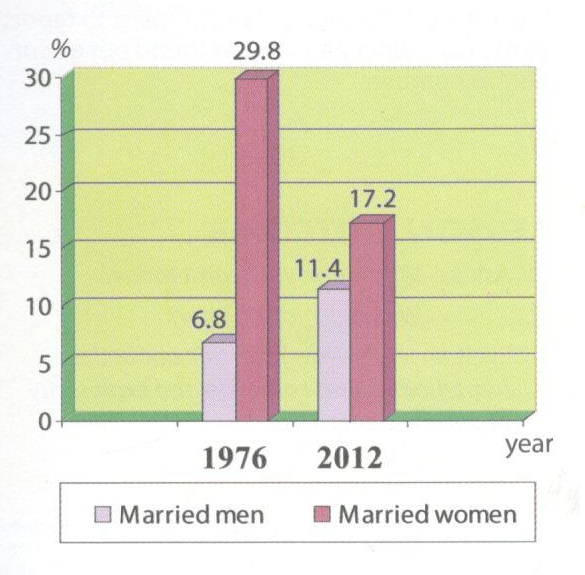
2. Listen to a family expert talking about how the roles of men and women in families have changed and decide whether the following statements are true (T) or false (F).
Lắng nghe một chuyên gia gia đình nói về việc vai trò của đàn ông và phụ nữ trong gia đình đã thay đổi như thế nào và quyết định xem những nhận định dưới đây là đúng (T) hay sai (F).
Click tại đây để nghe:
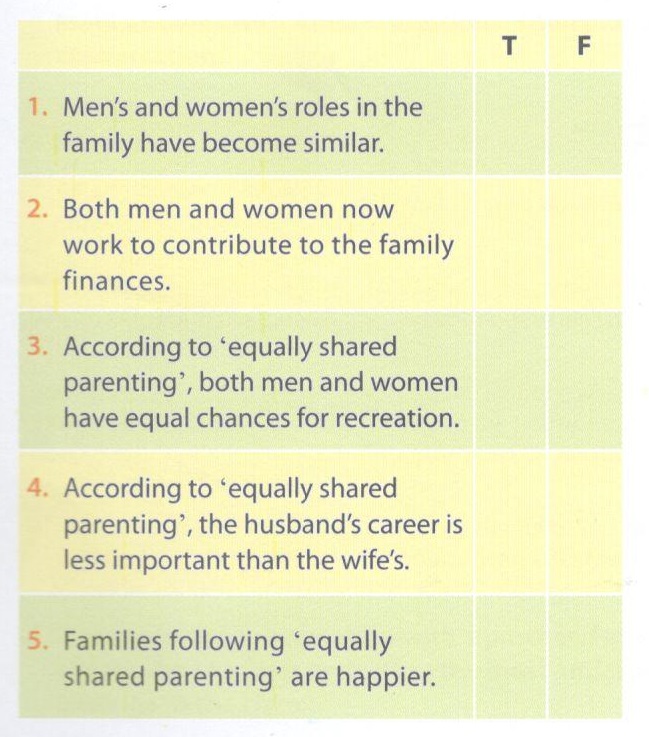
Key
1. T
2. T
3. T
4. F
5. T
Audio Script
Today we’ll discuss the changes in roles performed by men and women in the family. Changes in family life have made men’s and women’s roles more alike than ever as the wives are also be responsible for the family finances.
Family experts say the old notions of who does what in families may be more and more unclear. Men are not the sole breadwinners for the family like they used to be and they are becoming much more involved in housework and parenting.
Because men’s and women’s roles in families have become more alike, for couples to balance their work and family life, perhaps, equally shared parenting’ is the best solution. Equally shared parenting’ means the conscious and purposeful sharing’ in four domains of life:
1. Child-raising: Both parents have equal responsibility to nurture and to take care of the children;
2. Breadwinning: Husband’s and wife’s careers are equally important;
3. Housework: The household chores should be equally divided between the wife and the husband;
4. Recreation: Both partners have an equal chance and time for their own interests, and of course, to be with each other.
Experts have found out that families that can keep to those four principles of’equally shared parenting’ become happier and the divorce rate is the lowest amongst them.
3. Work in pairs. Match the word / phrase with its appropriate meaning.
Làm việc theo cặp. Nối từ / cụm từ với nghĩa phù hợp của nó.
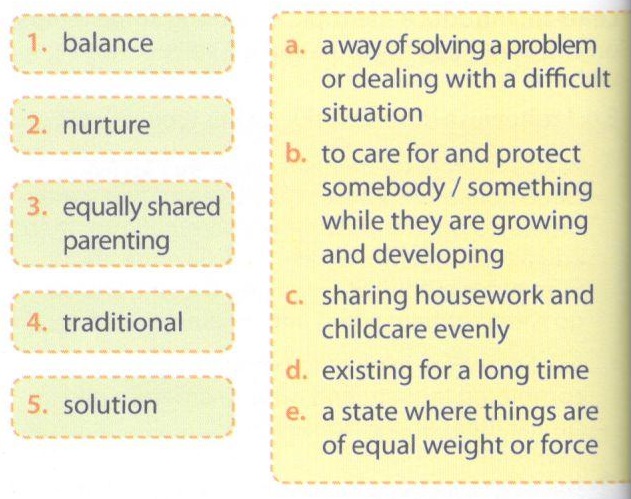
Key
1. e balance: một trạng thái mà mọi thứ đều cân bằng về khối lượng hay lực.
2. b nurture: quan tâm và bỏ vệ ai/cái gì trong khi chúng đang lớn lên và phát triển.
3. c equally shared parenting: chia sẻ việc nhà và chăm sóc con cái công bằng.
4. d traditional: đã tồn tại từ lâu.
5. a solution: một cách giải quyết vấn đề hay đối mặt với tình thế khó khăn.
4. Listen again and answer the questions.
Click tại đây để nghe:
Lắng nghe lại và trả lời các câu hỏi.
1. How has the role of men in the family changed? (Vai trò của đàn ông trong gia đình đã thay đổi như thế nào?)
2. How have men’s and women’s roles become alike? (Vai trò của đàn ông và phụ nữ trở nên tương đồng như thế nào?)
3. What is the result of "equally shared parenting”? (Kết quả của việc chia sẻ trách nhiệm phụ huynh công bằng là gì?)
Key
1. They are not the only breadwinner in the family, and they get more involved in housework and parenting.
2. Both are responsible for family finances, home-making / housework, and parenting.
3. The families become happier and the divorce rate amongst them is the lowest.
Writing
"Many hands make light work”.
1. Work in pairs. Discuss the meaning of the saying above. Do you agree with it? How does this saying apply to doing housework in the family?
Làm việc theo cặp. Thảo luận ý nghĩa của câu nói trên. Bạn có đồng ý với câu này không? Câu nói này áp dụng như thế nào vào làm việc nhà trong gia đình bạn?
2 Read the text about Lam’s family below and complete the chore chart.
Đọc bài văn sau về gia đình Lam và hoàn thành bảng công việc nhà.
I live in a family of four: my parents, my younger sister and I. We are all very busy people: both my parents work, my sister and
I spend most of our time at school, so we split the household chores equally.
My dad is responsible for mending things around the house. He also cleans the bathroom twice a week. My mum does most of the cooking and grocery shopping.
Being the elder child in the family, I take up a large share of housework. I do the laundry, take out the rubbish, and clean the fridge once a week. My younger sister An’s responsibilities include helping mum to prepare meals and washing the dishes. My sister and I take turns laying the table for meals, sweeping the house, and feeding the cat.
We do our share of housework willingly as we know that if everyone contributes, the burden is less and everyone can have some time to relax.
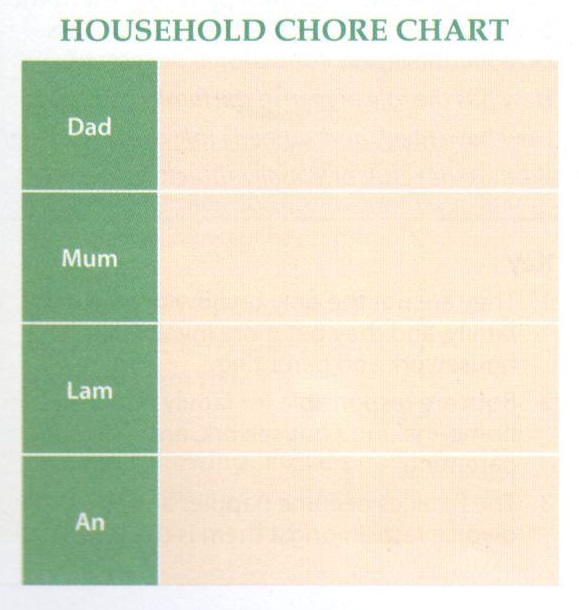
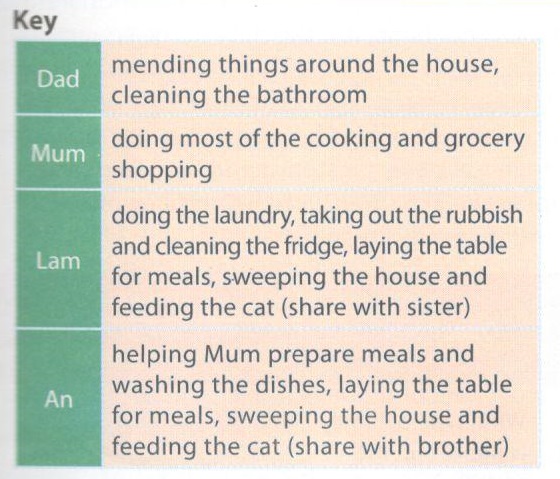
3. Read the text again and answer the questions.
Đọc lại đoạn văn và trả lời các câu hỏi.
1. How many people are there in Lam’s family? (Có bao nhiêu người trong gia đình Lam?)
2. Why are they very busy? (Tại sao họ rất bận rộn?)
3. How do they split the housework in the family? (Họ phân chia công việc trong gia đình như thế nào?)
4. What household chores does each member of the family do? (Những việc nhà nào mỗi thành viên trong gia đình làm?)
5. Do the family members enjoy the housework? (Các thành viên trong nhà có thích công việc nhà không?)
6. What are the benefits of everyone in the family sharing the housework? (Lợi ích của mọi người trong nhà chia sẻ việc nhà là gì?)
Key
1. There are four people in Lam’s family.
2. Because both parents workand the children spend most of their time at school.
3. They split the housework equally in the family.
4. The father mends things around the house and cleans the bathroom; the mother does most of the cooking and grocery shopping; Lam does the laundry, takes out the trash and cleans the fridge once
a week; An helps her mother to prepare meals and washes the dishes; Lam and An take turns laying the table for meals, sweeping the house, and feeding the cat.
5. Yes, they do. They do it willingly.
6. The burden is less, so everyone has time to relax.
4. Make your family chore chart. Then, using the ideas in the chart, write a paragraph about how people in your family share housework. You can use the questions in 3 as cues for your writing.
Làm bảng việc nhà của gia đình bạn. Rồi sử dụng những ý tưởng trong bảng, viết một đoạn văn về việc làm thế nào các thành viên trong gia đình bạn chia sẻ việc nhà. Bạn có thể sử dụng các câu hỏi ở bài 3 như các gợi ý cho bài viết.
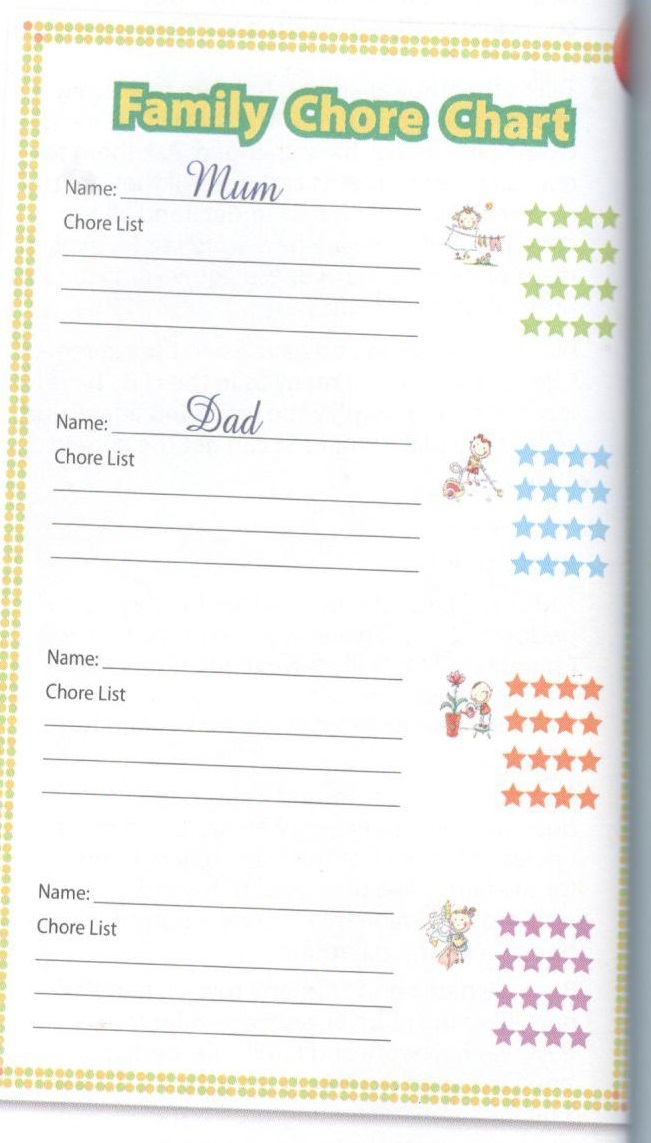
Read the text again. Do you understand the words from the context? Tick the appropriate meaning for each word from the text.
